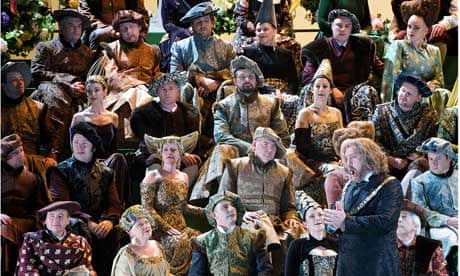Before a note of Welsh National Opera's new Die Meistersinger has been heard, Richard Jones's production makes its first statement. The front cloth is a giant, Sgt Pepper-style collage showing mugshots of four centuries of German artists, from Bach and Handel to Beuys and Fassbinder. The "holy German art" that Hans Sachs defends in his final, reproving monologue in Wagner's epic is something to be celebrated, the image suggests, and here are some of the men and women responsible for those achievements.
Yet as it unfolds over six hours, the production turns out to be less provocative than the opening seems to signal. Jones is quoted in the programme as saying that Wagner's Nuremberg is "more anachronistic than historically accurate", and that is reflected in Paul Steinberg's sets and Buki Shiff's costumes, which commute freely across the centuries from one scene to the next. At one moment, the setting seems to be the 16th century in which Wagner sited his music drama; elsewhere the dress seems to indicate the middle of the 19th, when the work was composed, while when the inside of Sachs's shop is finally revealed, the decor and electric lights suggest an epoch closer to our own time.
Yet these time shifts are handled unselfconsciously, and Jones unfolds the story with clarity and humour, and just occasional excursions (such as the depiction of the Nightwatchman) into his characteristic surrealism. Ultimately, though, the production is built around Bryn Terfel, taking on the role of Sachs for the first time, and providing its point of reference. He portrays the cobbler as a significantly younger man than the norm, giving much sharper piquancy to his relationship with Amanda Roocroft's credibly girlish Eva; Terfel's sound was less warm and velvety than we are used to, which suggests he is still coming to terms with the monumental part and that his Sachs has further psychological depths to explore and musical riches to exploit.
The wit is gentle, the treatment of Beckmesser, played superbly by Christopher Purves, far from cruel, and Purves provides the perfect foil to Terfel's larger-than-life performance. Brindley Sherratt's Pogner is suitably unbending, the other mastersingers appropriately stolid. Raymond Very's Walther lacks vocal variety and allure, but Andrew Tortise's David has the right boyish enthusiasm. If the drama occasionally sags it's more to do with Lothar Koenigs's conducting, imposing in the orchestral set pieces, less convincing in the longer dramatic paragraphs, than anything else.

Comments (…)
Sign in or create your Guardian account to join the discussion